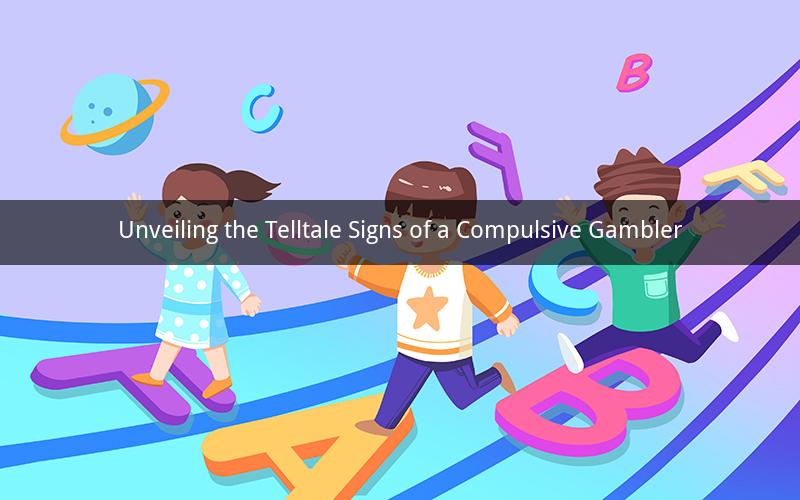
Compulsive gambling, often referred to as gambling addiction, is a serious issue that affects millions of people worldwide. Recognizing the signs of a compulsive gambler is crucial for those who suspect they or someone they know might be struggling with this addiction. This article delves into the various signs and symptoms that can help identify a compulsive gambler.
1. Preoccupation with Gambling
One of the most common signs of a compulsive gambler is a preoccupation with gambling. This individual may constantly think about gambling, planning their next bet, or reliving past gambling experiences. They may even experience vivid dreams about gambling or find themselves unable to concentrate on other activities due to their obsession with gambling.
2. Increasing Amounts of Money Spent on Gambling
As the addiction progresses, a compulsive gambler may start to spend increasing amounts of money on gambling. They may go to great lengths to find more money to gamble, including borrowing money, selling personal belongings, or even committing theft. The individual may also hide their gambling activities from family and friends to avoid being confronted about their financial struggles.
3. Failed Attempts to Stop Gambling
A compulsive gambler may have made several unsuccessful attempts to stop gambling. They may recognize the negative consequences of their gambling behavior but find it increasingly difficult to control their impulses. This may lead to feelings of guilt, shame, and frustration, but the individual may still struggle to break free from the cycle of addiction.
4. Neglecting Responsibilities
As the addiction intensifies, a compulsive gambler may start to neglect their responsibilities at work, school, or home. They may skip work or school to gamble, or they may neglect their family and friends to pursue their gambling habits. This can lead to strained relationships and a decrease in overall well-being.
5. Emotional and Psychological Symptoms
Compulsive gamblers often experience a range of emotional and psychological symptoms. They may become increasingly irritable, anxious, or depressed. They may also experience mood swings, paranoia, and a sense of hopelessness. These symptoms can further exacerbate their gambling addiction and make it even more challenging to break free.
6. Legal and Social Consequences
Compulsive gamblers may face legal and social consequences as a result of their addiction. They may be arrested for theft, fraud, or other crimes committed to fund their gambling habits. They may also experience social isolation, as their gambling addiction can strain relationships with friends and family.
7. Denial and Rationalization
A compulsive gambler may exhibit signs of denial and rationalization. They may downplay the severity of their addiction, blaming others for their problems, or rationalizing their behavior. They may also minimize the negative consequences of their gambling, claiming that they can control their addiction or that they will win back their losses soon.
8. Physical Symptoms
In some cases, compulsive gamblers may experience physical symptoms as a result of their addiction. These can include headaches, stomachaches, and other stress-related health issues. The constant stress of hiding their addiction and dealing with the consequences of their actions can take a toll on their physical health.
9. Relapse
Relapse is a common occurrence for compulsive gamblers. Even after making progress in recovery, they may experience a relapse and return to their gambling habits. This can be due to a variety of factors, including stress, triggers, or a lack of support. It's important for compulsive gamblers to seek ongoing support and treatment to minimize the risk of relapse.
10. Seeking Help
Recognizing the signs of a compulsive gambler is the first step towards seeking help. If you suspect that you or someone you know may be struggling with gambling addiction, it's important to reach out to a professional for support. Treatment options may include therapy, support groups, and medication, depending on the individual's needs.
Questions and Answers:
1. What is the most common sign of a compulsive gambler?
The most common sign of a compulsive gambler is a preoccupation with gambling, where the individual constantly thinks about gambling and finds it difficult to concentrate on other activities.
2. How can I tell if someone is hiding their gambling addiction?
A person with a gambling addiction may hide their gambling activities by lying about their whereabouts, avoiding questions about their finances, or becoming increasingly secretive.
3. What are the consequences of compulsive gambling?
The consequences of compulsive gambling can be severe, including financial ruin, legal problems, strained relationships, and mental and physical health issues.
4. Can a compulsive gambler recover from their addiction?
Yes, it is possible for a compulsive gambler to recover from their addiction with the right support and treatment. Many individuals have successfully overcome their gambling addiction and gone on to lead fulfilling lives.
5. How can I support a compulsive gambler in their recovery?
Supporting a compulsive gambler in their recovery involves being understanding, patient, and non-judgmental. Encourage them to seek professional help, attend support groups, and maintain a healthy lifestyle. Offer your support and understanding throughout their journey.